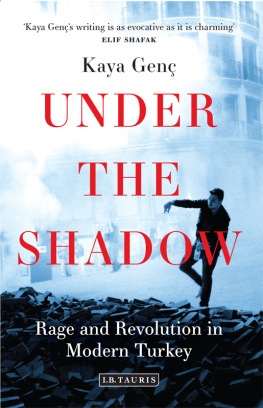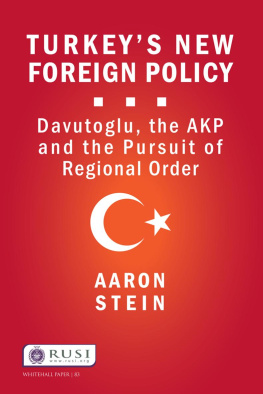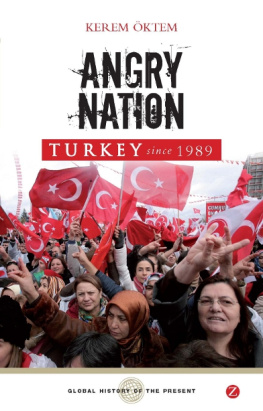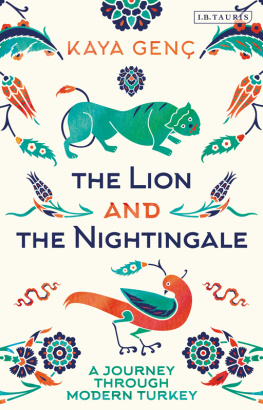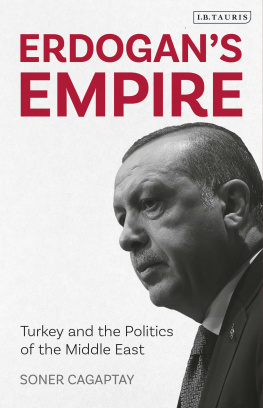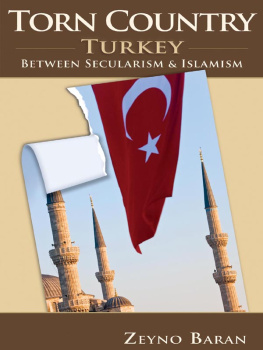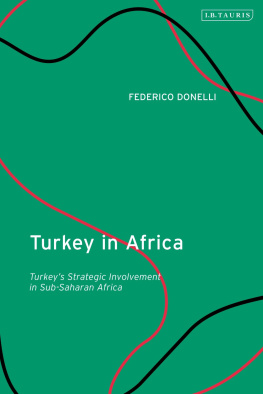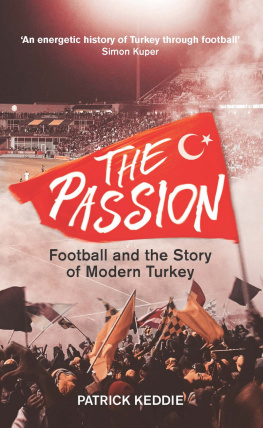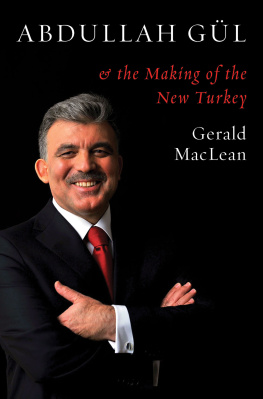
Kaya Gen is a novelist and essayist from Istanbul whose writing has appeared in the Paris Review , the Guardian , the Financial Times , the London Review of Books , Salon , Guernica magazine, Sight & Sound , The Millions , the White Review and TIME magazine, among others. His first novel, LAvventura , was published in 2008. Kaya has a PhD in English literature and is the Istanbul correspondent of The Believer and the LA Review of Books as well as a contributing editor at Index on Censorship . His article for the LA Review of Books , Surviving the Black Sea, was selected as one of the best non-fiction pieces of 2014 by The Atlantic .
Kaya Gen, a wonderful writer and tireless champion of literature, has done us all a great service by bringing together so many young voices on the Gezi movement. What a marvellous resource for everyone who is interested in this (lets face it) incredibly interesting moment in Turkish history.
Elif Batuman, New Yorker staff writer
Kaya Gen is one of the most interesting Turkish writers to have emerged in recent years. In his essays as well as his fiction, he converses across borders, while forging his own distinct voice and perspective and challenging dominant narratives.
Maureen Freely, President of English PEN, author of Th e Enlightenment and translator of Orhan Pamuk
Kaya Gens writing is as evocative as it is charming.
Elif Shafak, bestselling author of T he Architects Apprentice and Honour
UNDER
THE
SHADOW
Rage and Revolution
in Modern Turkey
Kaya Gen

Published in 2016 by
I.B.Tauris & Co. Ltd
London New York
www.ibtauris.com
Copyright 2016 Kaya Gen
The right of Kaya Gen to be identified as the author of this work has been asserted by the author in accordance with the Copyright, Designs and Patents Act 1988.
All rights reserved. Except for brief quotations in a review, this book, or any part thereof, may not be reproduced, stored in or introduced into a retrieval system, or transmitted, in any form or by any means, electronic, mechanical, photocopying, recording or otherwise, without the prior written permission of the publisher.
References to websites were correct at the time of writing.
ISBN: 978 1 78453 457 8
eISBN: 978 1 78672 069 6
ePDF: 978 1 78673 069 5
A full CIP record for this book is available from the British Library
A full CIP record is available from the Library of Congress
Library of Congress Catalog Card Number: available
Cover image: Protestors clash with Turkish riot policemen on the way to Taksim Square in Istanbul on 3 June 2013, as part of ongoing protests against the destruction of Gezi Park for a development project. (Bulent Kilic/AFP/Getty Images)
Cover design: Sandra Friesen
Typeset by Fakenham Prepress Solutions, Fakenham, Norfolk NR21 8NN
Contents
Who has never been burned in the sun
wont know the value of shadow
Turkish Proverb
Preface
Istanbul was once ruled by keyif , an old word which means both pleasure and a state of carelessness and joy especially during springtime. For a long time, I thought it was inevitable that books on Turkey would be full of scenes of Istanbul locals drinking cups of strong Turkish coffee in small seaside restaurants, or others smoking water pipes in cafes perched on hills overlooking the citys Bosphorus Strait a reminder of an enlightened empire that ruled continents. In April every year, the citys Judas trees blossom and lines of yellow tulips accompany the roads that lead to the citys financial centre, distracting even the most determined money-seekers: an hour to reflect on life can always be found in Istanbul. I have long felt the existence of a silent agreement among Istanbuls locals that they would do anything necessary to keep this state of keyif intact. Most people I know in this town, I thought, would never be exposed to protestors clashing with each other on the streets as the sound of gunfire echoes down Istiklal, or the flash of Molotov cocktails and the unbearable smell that lingers when riot police spray pepper gas into crowds, or the terror of tanks on city boulevards.
How brilliantly deceiving appearances can turn out to be. In the last three years, roughly from spring 2013 to autumn 2016, this ancient, Byzantine, laid-back vision of Istanbul has undergone such a startling transformation as to be almost unrecognizable. Nowadays Istanbuls reputation is increasingly that of a target of international terror. Stuck between Islamic State in Syria, Kurdish-populated cities in northern Iraq, and the eastern borders of the European Union, Turkey has become a dangerous place to live peacefully. It is like a passage between two rooms, or a tunnel between two different cultures, or a massive figure who stretches his arms between two worlds: the European Union which it had long struggled to join, and the troubled, war-torn cities of the Middle East which it had ruled during the reign of the Ottoman Empire.
It is sad to see my country, once best known for its sugary desserts, its magnificent rugs and the glory of its Islamic culture, becoming the site of bombs, political assassinations and street terror. How things change: as late as 2013, it felt like the only possible cause of street violence in Turkey would be the fight between student protestors. Suicide attacks? Car bombs? Tanks on the streets, and soldiers firing at citizens on the Bosphorus bridge? Unthinkable. I remember a subway commute to Istanbuls Taksim Square one day in 2013 when I heard the announcement of an emergency lock-down in the station. I ran to the subway exit and was lucky enough to escape above ground at the last possible moment, as riot police moved in. This was during the Gezi Park events in 2013, a time when the only thing that seemed to threaten the countrys peace was the prospect of a demonstration and its suppression.
Nowadays such protests have all but melted into the background. They are replaced by a new, darker, more ominous form of politics: the placing of bombs inside rubbish bins and news about foreign fighters wearing suicide belts walking into tourist groups to kill Europeans. The kidnapping of generals and the killing of anti-coup activists on the streets. What makes this even more depressing is that this was supposed to be a country that had achieved a liberal consensus through a process of demilitarization and normalization, and the sidelining of hardliners to make way for moderates and common sense. Only three years have passed since Turkey was described in such a way, and the country has since become such a violent stage for political conflict that its elderly citizens point to the dark period of 1970s radicalism as a worrying example that parallels the present. Istanbul is recovering from a military coup which killed hundreds of civilians. On 28 June 2016, three Islamic State suicide bombers killed 45 people in the lobby of Atatrk Airport.
For some of the people in this book, this moment in Turkey is a moment of release: the release of desires repressed for so long for different reasons. The more philosophically minded would say this is the moment of truth: the replacement of liberal illusions with the cold reality of haves and have-nots, liberals and conservatives, the old versus the young. In the years leading up to the 2013 Gezi protests, all people could speak about in Turkey was reconciliation, consensus and harmony: all signs of order posited against the dastardly prospect of a chaotic era whose arrival needed to be stopped by all means necessary. But dreams of an ordered society were in conflict with the passionate, the hot-headed and the energetic Turkeys young people. Many on the left and the nationalist right, as well as in the radical Kurdish movement, objected to the early 2010s atmosphere in Turkey that had been forged around the concept of peace and liberalism, warning the country against an all-powerful Turkish state under Recep Tayyip Erdoan. All the talk about keyif and the flourishing tourism on Turkeys Mediterranean coasts, the wisdom of Constantinoples history, the mysterious bazaars of Istanbul now open to the worlds tourists: that meant nothing to the young, the radical and the othered. While well-intentioned travellers to Istanbul enjoyed the peace that ruled Turkey, others prepared for war. The disillusioned and the dispossessed were looking for a day of uprisings. Be careful what you wish for, the popular saying goes, because you may end up getting it.
Next page
